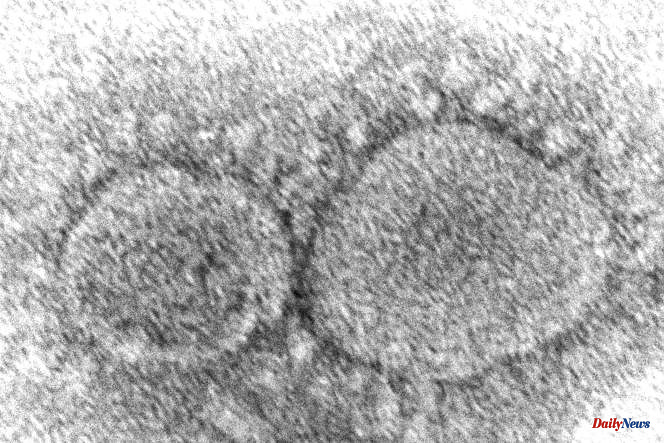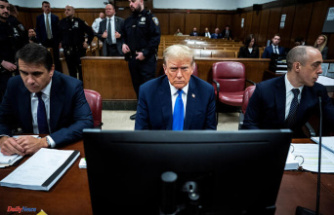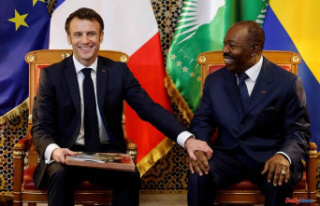The declaration made the headlines of all the Western press. "The Covid pandemic most likely originated in a potential incident at a lab in Wuhan," FBI Director Christopher Wray said on February 28 on conservative Fox News, adding that he was speaking with a "moderate" level of confidence.
In November 2021, the famous American federal agency already considered the thesis of a "plausible" laboratory leak, and called for more investigation, without however judging as it does today that this track had its preference.
Scientists who are interested in the question of the origins of Covid-19 remain for the moment in expectation: "The information is that now they are leaning to one side", observes Florence Débarre, researcher in evolutionary biology at the Institute of Ecology and Environmental Sciences in Paris and research director at the CNRS.
The FBI is not very vocal about its reasons
This media release has satisfied proponents of the SARS-CoV-2 lab leak thesis, such as molecular biologist Alina Chan, who calls it "reasonable":
“Lab accidents occur with surprising frequency. A lot of people don't hear about it because it's not made public. »
The FBI did not give reasons for its announcement, leaving many observers confused. “It is increasingly difficult to understand the origin of the allegations of the lab leak, the rumors are spreading, now supported by the FBI. And yet, no new evidence has been shared, "said Thea Fischer, professor of public health in Copenhagen (Denmark), on Twitter.
Many lament a sense of déjà vu. The only argument raised publicly by the FBI, China's desire to obstruct investigations into the origin of the virus, has long been part of the picture. "There are no new elements, it is only the recycling of old information", regrets Florence Débarre.
Several experts are surprised by the echo encountered by the interview with Christopher Wray. “There is so little new information that a non-event becomes an event. It's Groundhog Day," tweeted American zoologist Peter Daszak, a collaborator at the Wuhan Institute of Virology and early defender of the natural origin thesis.
A charged political context
Moreover, the timetable for Mr. Wray's exit raises questions, in the light of the tense relations between Beijing and Washington. The two superpowers clashed in early February after the discovery of a suspicious Chinese balloon over American territory. The United States has since displayed an aggressive stance. "They are very unhappy with China's passive support for Russia in the war in Ukraine, and this balloon [was] a divine surprise to show that the Chinese are practicing an unfriendly but lawful act," the researcher told Le Monde in February. in international relations Sébastien-Yves Laurent. Communication on the origin of the virus could, in this sense, be part of the same strategy: making information from intelligence agencies public to put China under pressure.
Continuing this electric sequence, Christopher Wray was very accusatory of Beijing, speaking of "a potential leak from a Chinese government-controlled lab that killed millions of Americans" . From this point of view, the statements of the FBI can be interpreted as a new means of pushing China against the wall. "We do not know if this communication is political or if there are real scientific facts behind these assertions", regrets Etienne Decroly, virologist and CNRS research director at the AFMB laboratory (Architecture and function of biological macromolecules). “But we need robust elements to verify the hypotheses. »
A Wuhan laboratory in the role of the ideal culprit
Bluff or unpublished information? Mystery. The FBI is not the only American intelligence office to have changed its tune recently.
The U.S. Department of Energy, which has an internal intelligence agency, has updated its judgement, and also considers "likely", albeit with "low confidence", the thesis of a laboratory leak. . According to information from CNN, their teams learned that virology work on a "coronavirus variant" was being carried out by the Wuhan Center for Disease Control (CDC) "around the start of the epidemic".
This center has an ideal culprit profile. Less known than the neighboring virology institute, the Wuhan CDC moved at the end of November 2019 near the now famous Huanan market, where the epidemic began. He specializes in expeditions to caves in remote provinces to collect bat virus samples. And several archival videos testify to the low level of protection of its workers.
However, the scientific community remains skeptical. First, because CNN confusingly refers to research on a “coronavirus variant,” a misnomer for a family of viruses. They speak "probably of a virus which does not correspond completely to SARS-CoV-2 but which resembles it", interprets Etienne Decroly, who recalls that we only know of him for the moment distant cousins.
Second, because it contradicts what is known about the function of the Wuhan CDC. “They certainly collected animal samples, but I never heard of the fact that they were conducting virological experiments,” said Edward Holmes, a virologist used to working with Chinese researchers.
A debate far from settled
For the rest, the opinion of the FBI and the Department of Energy remains in the minority. The United States has seventeen intelligence agencies, seven of which investigated the origin of the virus, at the request of President Joe Biden. If two of them are now leaning towards an accidental laboratory leak, five others opt instead for contamination in nature – the most common scenario for a pandemic. "There is currently no consensus within the government," acknowledged US Security Council spokesman John Kirby.
Most agencies recognize that they can only speak with a low level of confidence, due to a lack of evidence. "If they found evidence that the Wuhan lab had a SARS-CoV-2 progenitor, that would tip towards leaking the lab, but it wouldn't be with a low level, but a high level of confidence," Florence points out. Get out. That would be real information. »
That's the problem with this debate. No conclusive evidence has yet been provided to support one hypothesis or another. That of zoonosis, for example, comes up against the impossibility to date of identifying the infected animal which could have transmitted the virus to humans. That of the laboratory leak is no more advanced: none of the virus sequences referenced by the main laboratories and known to date correspond to a direct ancestor of SARS-CoV-2. In both cases, China is blocking the investigations.












